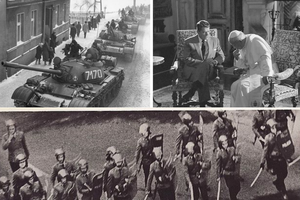Christmas Bells Ring Hopeful Notes Amid a Weary World
COMMENTARY: Longfellow’s 1863 Civil War-era poem reflects the resilience of the human spirit and packs power today.

The Christmas season of 2021, for most if not all of us, marks the end of a difficult year. Yet Christmas brings hope.
Christmas carols remind us not to despair, for a babe born in Bethlehem offers us a bright new hope: “God rest ye merry gentlemen, let nothing you dismay./ Remember Christ our Savior was born on Christmas Day/ To save us all from Satan’s pow’r when we were gone astray.”
The theme of hope overcoming despair recurs again and again in Yuletide carols. In O Holy Night, we hear the words, “Long lay the world in sin and error pining, ’till he appeared and the soul felt its worth; a thrill of hope, the weary world rejoices, for yonder breaks a new and glorious morn.”
Difficult as this year has been, it is far from unique in the annals of human history. And it has not been easy for certain individuals.
The year 1863 was particularly difficult for the distinguished poet and translator Henry Wadsworth Longfellow (1807-1882). His country was embroiled in a civil war that he hated in which his son, Charley, was severely wounded. In addition, he was grieving over the loss of his wife, Frances, who died two years earlier in a freak accident in their home. His grief led him into a depression.
On the first Christmas following her death, he stated in his diary, “How inexpressibly sad are all holidays.” Six months later, still wearied by them, he wrote: “I can make no record of these days. Better leave them wrapped in silence. Perhaps someday God will give me peace.” Would that day ever come?
In September 1862, when Longfellow heard the news of the Civil War battle at Second Manassas, in which more than 2,800 Americans were killed and more than 14,000 wounded, he wrote in his journal, “Every shell from the cannon’s mouth bursts not only on the battle-field, but in far-away homes, North or South, carrying Dismay and death. What an infernal thing war is!”
On Christmas Day in 1863, Longfellow wrote Christmas Bells, a poem that includes the following verse: “I heard the bells on Christmas Day. Their old familiar carols play, and wild and sweet the words repeat of peace on earth, goodwill to men!”
These words are familiar to us in the popular carol I Heard the Bells on Christmas Day. The modern version makes no reference to the Civil War. But, for Longfellow, reference to the war was unavoidable since it seemed to drown the delicate sound of Christmas bells: “It was as if an earthquake rent the hearth-stones of a continent and made forlorn the households born of peace on earth, goodwill to men!” Can there be peace if a civil war has overtaken the country?
If our story ended here, it would, indeed, be a sad one. But hearing the bells had a most salutary effect on Longfellow. And so, he went on to state, as the conclusion to his poem, “Then pealed the bells more loud and deep. God is not dead nor doth he sleep; the wrong shall fail, the right prevail, with peace on earth, goodwill to men.” Good is stronger than evil; peace is more real than despair.
Hearing the bells on Christmas Day lifted the poet out of his gloom, reminding him that God does exist and has plans that we poor human beings cannot begin to comprehend. He became, that Christmas Day, born again, as did Ebenezer Scrooge in Charles Dickens’ classic. His renewed trust in God reminds us of that most patient of all biblical characters, Job, who declared to God in the midst of excruciating difficulties, “I know that you can do all things and that no purpose of yours can be thwarted. Therefore, I have uttered what I did not understand, things too wonderful for me, which I did not know” (Job 42:2, 3b).
The restoration of hope on Christmas Day was, for Henry Wadsworth Longfellow, a testimony to the resilience of the human spirit. But his story is a lesson for all of us. We can all “listen to the bells” and hear something that goes far beyond our own problems. We can still hear the bells on Christmas Day, even in the year 2021.
When we listen to Bing Crosby or Frank Sinatra sing I Heard the Bells on Christmas Day on the radio or in a shopping mall, we experience a certain delight. But when we put aside our worldly cares — including the annual ritual of cut-throat “Christmastime” consumerism — and listen to the same bells as Henry Wadsworth Longfellow did on Christmas Day in 1863, we are more truly transported to that very first Christmas, when Christ our Savior brought real hope into a tired world.

















